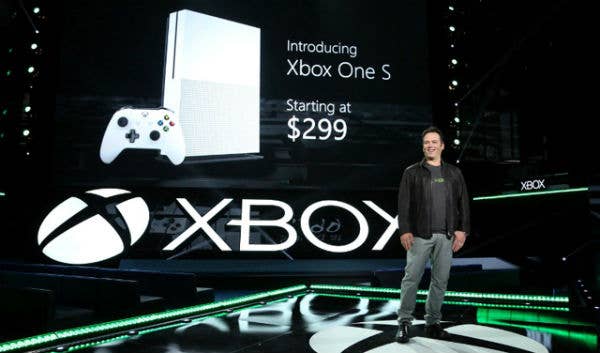Microsoft's New Xbox Brings Lofty Pre-launch Promises Down to Earth
Turns out Xbox One was a scalable system... just not the way Microsoft promised.
This article first appeared on USgamer, a partner publication of VG247. Some content, such as this article, has been migrated to VG247 for posterity after USgamer's closure - but it has not been edited or further vetted by the VG247 team.
We're at E3 this week, covering the year's biggest gaming event. Be sure to check out all our coverage on our E3 2016 hub!
Back in 2013, Microsoft's plans for Xbox One were rather different than the system we know today. Remember all those general entertainment plans? Remember the movies and TV series? And most of all, remember... always online?
The original plan for Microsoft's console involved requiring the system to be online in order to operate, with games and hardware alike calling home frequently to register with the network. It was, quite clearly, an attempt to curtail piracy paired with a larger corporate drive to turn the Xbox brand into the hub of a connected household and a media empire that expanded well beyond gaming. And it was instantly, passionately, angry reviled by Xbox fans the world over.

Microsoft put on a brave face at the start, trying to convince the world that Xbox One's debut event wasn't the disaster most painted it as. Eventually, the withering hatred of the gaming community won the day, and the Xbox One marketing plan changed — as did that odious always-online connection requirement. Before Microsoft gave into the inevitable, though, their central justification for the Xbox One's forced Internet connection had to do with the promise of the cloud. This in turn doubled as a counterargument against the PlayStation 4: Yes, Sony's new console would be more powerful than Xbox One, but Microsoft's console would have the ability to tap into Microsoft's massive server array of 300,000 computers to help with computations! Xbox One needed to be permanently online in order to make the most of games, and that mandatory internet connection would enhance the console and allow its software to scale beyond the basic capabilities of the hardware itself.
Well, maybe not. Today Microsoft announced a new plan through which the Xbox One will be able to scale up in power... but that scheme has nothing to do with the cloud. Instead, the console will be beefing up the old-fashioned way: With hardware, not connectivity. By making customers buy a new, more powerful system.
Xbox One will be undergoing two evolutionary steps over the next 18 months. This fall, Microsoft will be releasing the Xbox One S; unlike slim hardware iterations of the past, though, the S won't simply be a more compact rendition of the existing model. It will offer modest graphical gains for games, and its video player will support 4K discs. Full 4K support will arrive a year later with the model Microsoft has dubbed Project Scorpio, which is practically a new console speaking strictly in terms of processing power. But this model will also break with the past by existing as an advanced model of the Xbox One rather than a replacement; its support for original Xbox One games won't be a matter of backward compatibility in the traditional sense. Instead, software will simply scale according to hardware, offering better performance on Scorpio but nevertheless running on Xbox One as well.
The end result should be more or less analogous to the cloud-based scalability Microsoft was promising three years ago. The mechanism for scaling software design, however, falls well short of those early claims. Rather than creating a future-proof console with Xbox One, Microsoft simply gave us one that won't go obsolete as quickly — hardly the same thing.
My suspicion, however, is that this doesn't represent a massive change in Microsoft's plans so much as it does the application of a dose of reality to some impossible promises. Xbox One has made use of the cloud enhancements Microsoft talked about before launch, but rarely, and in a way that leaves the impression that the tech had decidedly limited applications. The biggest uses of the cloud appeared in Titanfall and Forza 6, with next year's Crackdown slated to put those servers to use as well. What those three games have in common is that they all feature shared, online, multiplayer spaces. And, correspondingly, all three used (or will use) cloud enhancements not to boost graphics or anything like that, but rather to process elements within the shared space. In Titanfall and Forza, the cloud powered artificial intelligence bots; in Crackdown, it will handle the physics and management of the game's highly destructible interactive environments.

So, the cloud has its value for Xbox One fans, to be sure. But it's a far cry from the never-obsolete, ever-growing console that Microsoft executives implied it would be. On the contrary, the use of external servers to offload shared multiplayer elements onto was a handy but hardly revolutionary trick; PC games, especially MMO RPGs, have been doing it for years. If anything about Xbox One is revolutionary, it's that the upcoming hardware revisions work more along the lines of mobile phone revisions rather than as traditional console revamps and generational leaps; heck, the name Xbox One S lifts Apple's iPhone naming nomenclature verbatim. And even then, that's not precisely a revolution, since Sony straight-up said they're doing the same thing with PlayStation 4.
I was always skeptical of the Xbox One cloud scheme as it was pitched to me back at the system's unveiling, but I would love to have seen it pan out as promised. Instead, it looks like console makers are looking to the mobile phone model, which perhaps not coincidentally places the burden of keeping up with the console race's bleeding edge on consumers rather than on corporate infrastructure. While both Scorpio and PlayStation 4 Neo sound promising, they also represent a significant new frontier in gaming's ongoing race to nickel-and-dime consumers.
We're at E3 this week, covering the year's biggest gaming event. Be sure to check out all our coverage on our E3 2016 hub!

